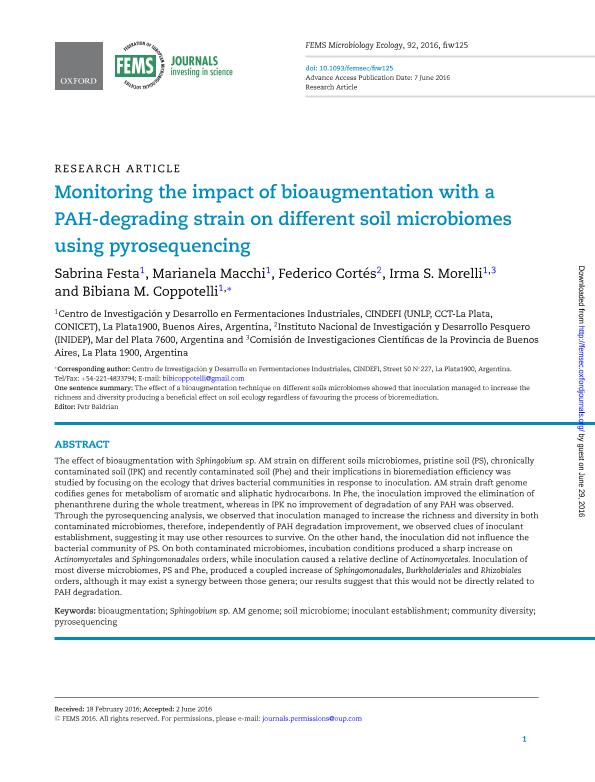Artículo
Monitoring the impact of bioaugmentation with a PAH-degrading strain on different soil microbiomes using pyrosequencing
Festa, Sabrina ; Macchi, Marianela
; Macchi, Marianela ; Cortés, Federico
; Cortés, Federico ; Morelli, Irma Susana; Coppotelli, Bibiana Marina
; Morelli, Irma Susana; Coppotelli, Bibiana Marina
 ; Macchi, Marianela
; Macchi, Marianela ; Cortés, Federico
; Cortés, Federico ; Morelli, Irma Susana; Coppotelli, Bibiana Marina
; Morelli, Irma Susana; Coppotelli, Bibiana Marina
Fecha de publicación:
06/2016
Editorial:
Wiley Blackwell Publishing, Inc
Revista:
Fems Microbiology Ecology
ISSN:
0168-6496
Idioma:
Inglés
Tipo de recurso:
Artículo publicado
Clasificación temática:
Resumen
The effect of bioaugmentation with Sphingobium sp. AM strain on different soils microbiomes, pristine soil (PS), chronically contaminated soil (IPK) and recently contaminated soil (Phe) and their implications in bioremediation efficiency was studied by focusing on the ecology that drives bacterial communities in response to inoculation. AM strain draft genome codifies genes for metabolism of aromatic and aliphatic hydrocarbons. In Phe, the inoculation improved the elimination of phenanthrene during the whole treatment, whereas in IPK no improvement of degradation of any PAH was observed. Through the pyrosequencing analysis, we observed that inoculation managed to increase the richness and diversity in both contaminated microbiomes, therefore, independently of PAH degradation improvement, we observed clues of inoculant establishment, suggesting it may use other resources to survive. On the other hand, the inoculation did not influence the bacterial community of PS. On both contaminated microbiomes, incubation conditions produced a sharp increase on Actinomycetales and Sphingomonadales orders, while inoculation caused a relative decline of Actinomycetales. Inoculation of most diverse microbiomes, PS and Phe, produced a coupled increase of Sphingomonadales, Burkholderiales and Rhizobiales orders, although it may exist a synergy between those genera; our results suggest that this would not be directly related to PAH degradation.
Archivos asociados
Licencia
Identificadores
Colecciones
Articulos(CINDEFI)
Articulos de CENT.DE INV EN FERMENTACIONES INDUSTRIALES (I)
Articulos de CENT.DE INV EN FERMENTACIONES INDUSTRIALES (I)
Citación
Festa, Sabrina; Macchi, Marianela; Cortés, Federico; Morelli, Irma Susana; Coppotelli, Bibiana Marina; Monitoring the impact of bioaugmentation with a PAH-degrading strain on different soil microbiomes using pyrosequencing; Wiley Blackwell Publishing, Inc; Fems Microbiology Ecology; 92; 8; 6-2016; 1-12
Compartir
Altmétricas



